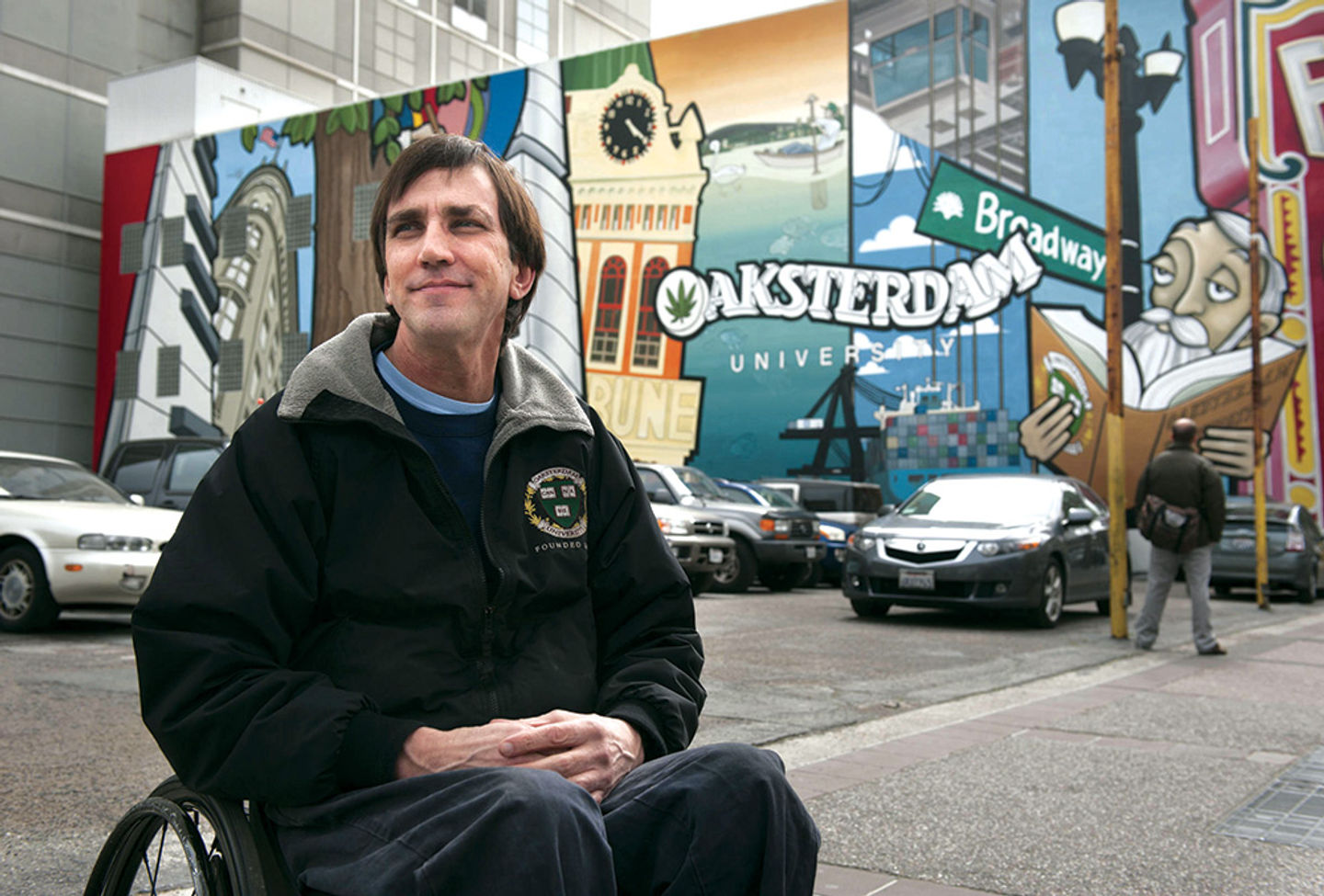The Mayor of Oaksterdam
On July 27, the Cannabis community lost one of its most consequential activists: Richard Lee, the paraplegic medical marijuana user turned entrepreneur who came to be known as the “Mayor of Oaksterdam.” This month, we look back at Lee’s life and his role in transforming Oakland into one of the nation’s Cannabis reform capitals.
The Accidental Activist
Raised in a conservative Republican household in Houston, Texas, Richard Lee was an adrenaline junkie from a young age, developing passions for riding motorcycles, diving, flying gliders and live music.
In 1984, he dropped out of college and spent the rest of the decade as a roadie, eventually landing a gig as a lighting tech for Aerosmith on their 1990 Pump Tour. One day, while working at New Jersey’s Meadowlands, he slipped and fell from a catwalk. Tragically, the accident left him paralyzed from the waist down, condemning him to life in a wheelchair at the age of 27.
In addition, Lee also suffered from chronic nerve pain and muscle spasms, and soon realized that Cannabis was the best treatment. But it would take another unfortunate incident a year later to turn Lee into an activist.
“In 1991, I was the victim of a carjacking, and the police response time was 45 minutes, which angered me more than the actual carjacking. I blamed the lack of police protection on Cannabis prohibition,” he told High Times in 2009. “I felt like, here was this wonderful medicine of Cannabis that had helped me so much, and why were the cops going after people using and selling it instead of the psychos and sociopaths who are out there robbing people?” Lee later told SF Gate. “I thought I should do something about it.”
Going to California
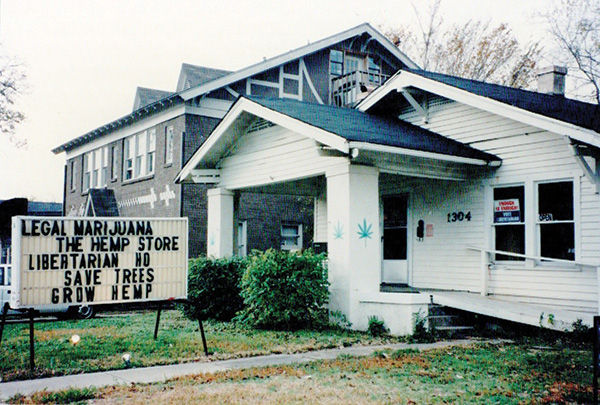
In 1992, Lee opened one of the nation’s first hemp shops in Houston, Legal Marijuana – The Hemp Store, and began publishing a pro-pot newsletter. It was while handing out these newsletters at a smoke-in on the steps of the Colorado state Capitol in Denver in 1993 that he met a young activist from South Dakota named Jeff Jones, who was inspired by the information in the pamphlet.
The following year, Jones moved to Oakland, met activism icons like Debbie Goldsberry, Ed Rosenthal and Dennis Peron, and dove headfirst into the movement. In mid-1995, he started a Cannabis delivery service, and within a year, it had blossomed into one of the nation’s first dispensaries, the Oakland Cannabis Buyers’ Cooperative. The club was so popular that, in July 1996, the city of Oakland officially endorsed it four months before Prop 215 was even passed.
After visiting Jones in Oakland in 1996, Lee offered to provide the dispensary with Cannabis at a discounted rate. Upon returning to Texas, Lee began mailing pounds of weed to OCBC, which alarmed Jones.
“I’m like, oh my God — I can’t do business like this!” Jones recalls. “So I got him on the phone and convinced him to move to Oakland.”
Lee relocated to Oakland in 1997, co-founded the Hemp Research Company, set up an indoor grow and began supplying the shop with high-quality, low-cost Cannabis.
U.S. V. OCBC
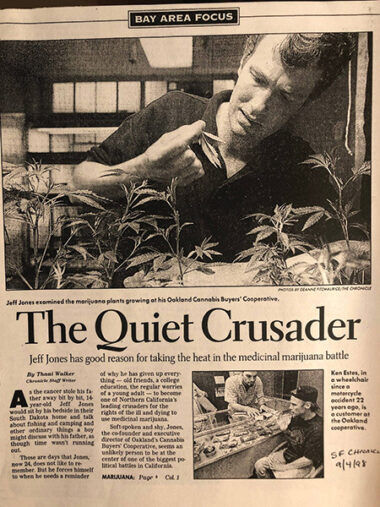
Under Prop 215, OCBC was thriving, servicing upward of 2,000 patients. Unfortunately, the feds would soon step in to reassert their authority.
On January 9, 1998, the U.S. government sued the OCBC in an attempt to shut it down. The district judge issued an injunction prohibiting them from operating until the case was resolved. When their appeal was denied, Jones defied the injunction and continued to distribute medicine. As a result, he was held in contempt, and on October 19, federal marshals shut down the OCBC for good. Jones instead opened the Patient ID Center to help Cannabis patients.
Meanwhile, Jones continued appealing his case all the way to the Supreme Court, hoping to force federal recognition of medical Cannabis … but on May 14, 2001, the Supreme Court unanimously rejected Jones’ medical necessity defense.
Bringing Amsterdam to Oakland
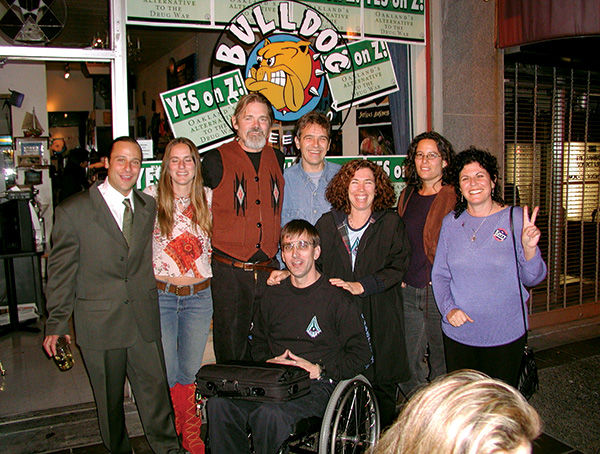
Nevertheless, Oakland’s other activists remained undeterred. Shortly after its closing, OCBC’s CFO Jim McClelland opened a speakeasy-style dispensary called the Zoo. And in 1999, Lee opened his own dispensary, the Bulldog Coffeeshop, modeled after Amsterdam’s classic Cannabis cafe.
In 2003, he opened a second coffee shop called SR-71, which was renamed Coffeeshop Blue Sky four years later. Lee’s goal in opening these Cannabis cafes was to “bring Amsterdam to Oakland,” as he later explained in a 2010 NPR interview: “Amsterdam is our model city. When I go there, I see tourists and jobs and taxes being created from the Cannabis industry, and I think we can do that here.”
So naturally, it was only a matter of time before McClelland thought up the brilliant pot-manteau “Oaksterdam.”
In 2005, Lee opened the Oaksterdam Gift Shop and partnered with activist couple Chris Conrad and Mikki Norris to publish the Oaksterdam News, a quarterly newspaper covering all things California and Cannabis-related. But it was while attending the 19th Cannabis Cup (to receive High Times’ Freedom Fighter of the Year award) that Lee got the inspiration for his most impactful endeavor: Oaksterdam University.
School of Pot
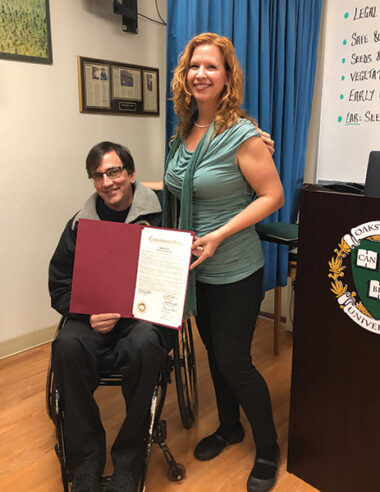
“Oaksterdam University started after I went to Amsterdam in 2006 and saw the Cannabis College, a kind of small information center,” Lee once explained. “I thought it would be a good idea to take it to the next level by actually offering classes.”
And so, Lee and his team wrote up a curriculum and launched Oaksterdam University. The first classes, attended by 22 students, were held on November 10th, 2007, in a small room across the street from his gift shop.
Three months later, Jones began hosting classes at his Patient ID Center (Oaksterdam’s LA campus). It was here that Dale Sky Clare entered the picture. In the summer of 2007, Clare was working with a medical marijuana doctor in Orange County when she reached out to California NORML director Dale Gieringer for some information. Gieringer referred her to Jones, who not only won her over to the cause but also won her heart. Within a year, she was dating Jones and working full time at OULA.
By 2010, the university had expanded into a 30,000-square-foot space that included multiple classrooms, an auditorium, a theater, a horticulture lab, a nursery and even a museum, as well as auxiliary campuses in Sebastopol and Flint, Michigan. That July, Dale became Mrs. Jones.
Marijuana Measures
The media attention surrounding the university drew tourism and revenue to Oakland. Lee used the profits generated by his businesses and the goodwill he’d garnered among local officials to advance a series of local legalization initiatives.
In 2003, he formed the Oakland Civil Liberties Alliance and put forward Measure Z, a city ballot question that made sales, cultivation and possession of Cannabis the lowest priority for law enforcement. The measure passed in 2004 with 65% of the vote. Next came Measure F, another citywide initiative seeking to impose a 1.8% tax on Cannabis businesses. In July 2009, the measure passed with 80% of the vote, making Oakland the first city in America to tax Cannabis sales.
With two electoral victories now under their belts, Lee and his crew were emboldened to swing for the fences: full statewide legalization and taxation of Cannabis.
Proposition 19
In 2009, Lee, Jones and others drafted a four-page voter initiative entitled the “Regulate, Control and Tax Cannabis Act of 2010,” and began the laborious task of gathering the 434,000 signatures needed to get it onto the ballot for the November 2010 election.
Among its provisions, the measure would repeal all previous local and state Cannabis laws and expunge all convictions under those laws. It would allow adults 21 and over to possess up to an ounce of Cannabis and cultivate a personal garden up to 25 square feet.
Despite heavy opposition (including from some within the movement), Lee spent $1.3 million of his own money (his life savings) to get his initiative to the finish line, collecting almost twice the number of signatures needed in less than half of the time allotted. Polling at 56%, Proposition 19 (coincidentally, the same number as another legalization initiative in 1972) was on track to pass.
Unfortunately, a pair of October surprises ultimately sabotaged Prop 19, causing it to fall short. What’s worse, their near victory once again drew unwanted attention from the feds.
Oakland Raiders
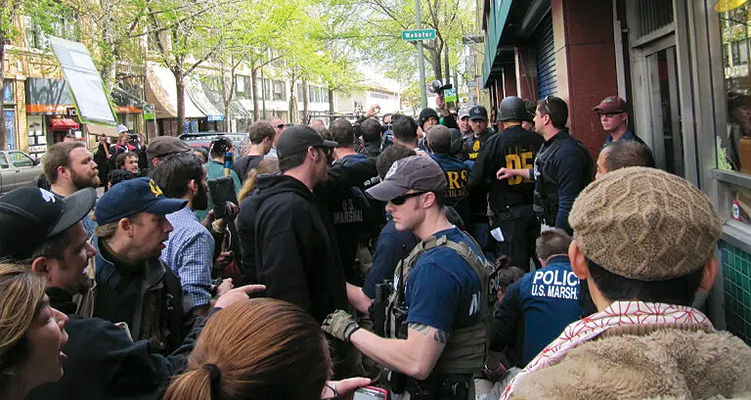
On April 2, 2012, agents from the IRS, DEA, ATF and U.S. Marshals Service raided Oaksterdam University, as well as Lee’s home and other businesses. Hundreds of outraged locals protested outside Lee’s establishments as officials looted them, shutting down streets, brazenly blazing, booing and cursing at the police and chanting “Shame!” and “DEA, go away.” Ultimately, authorities confiscated around 60,000 plants, as well as all of their computers, files and bank accounts.
Lee was detained, but was not arrested and never charged. Nevertheless, the raid forced Lee to reevaluate his situation. Facing a mountain of debt and likely future “criminal enterprise” charges, he decided it was best to retire early. And so, Lee divested from his businesses and entrusted them to the longest-standing employee in each company, which, in the case of Oaksterdam University, was Chancellor Dale Sky Jones, who became president and CEO.
Keeping the Faith
With the loss of most of their assets, faculty and students, Sky Jones would have to start from scratch — relocating to a smaller space and rebuilding the staff and curriculum to keep the school afloat. Under her stewardship, the university rose from the ashes to become more successful than ever. Today, the school is mostly online, offering dozens of courses and boasting over 100,000 alumni from 116 countries.
As for Lee, he continued to inspire Cannabis justice nationwide. In 2018, he moved back to Houston to care for his mother, with whom he founded Republicans Against Marijuana Prohibition (RAMP).
Richard Lee died in a Houston hospital on Sunday, July 27, from cancer-related complications. He was 62 years old. The announcement of his death elicited memorial messages of sorrow and admiration from all across the Cannabis community.
“There are few people who have single-handedly advanced our cause as much as Richard Lee,” Paul Armentano, NORML’s deputy director and Oaksterdam University’s science chair, memorialized. “His contributions and his legacy will not be forgotten.”

